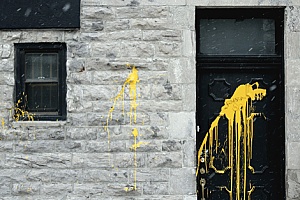 Willfully defacing or damaging public or private property is considered a criminal act in the state of Virginia, subject to a wide range of consequences. Less severe cases can result in a misdemeanor charge with a small fine, while others could be classified as a class 6 felony with possible jail time. This article will take you through what Virginia considers destruction of property, and how these situations are usually dealt with in court.
Willfully defacing or damaging public or private property is considered a criminal act in the state of Virginia, subject to a wide range of consequences. Less severe cases can result in a misdemeanor charge with a small fine, while others could be classified as a class 6 felony with possible jail time. This article will take you through what Virginia considers destruction of property, and how these situations are usually dealt with in court.
What Are the Different Types of Destruction of Property?
Destruction of Private Property
Destruction of private property is the most common type of destruction of property that the courts usually come across. Officially called “Destruction of Property (without Intent to Steal)”, under VA. Code 18.2-137, these charges are usually the result of lover spats, neighbor feuds, and various other domestic issues. They include damage to small personal items such as cell phones, televisions, cars, fences, and more.
If the damage is less than $1000, the person will be charged with a misdemeanor (class 1 or 3) and will be faced with a fine (determined by the court). Damage valued over $1000 is considered a class 6 felony and may result in either a higher fine (up to $2500), and at least five years in prison. However, these types of destruction or property cases are usually easily resolved by the convicted providing restitution to the property owner, either by paying the damage or replacing what was damaged.
Other private property cases include ‘damage or tampering to a vehicle, or using the vehicle to commit a crime,’ a charge warranting a class 1 misdemeanor under VA. Codes 18.2-146 and 147. Destruction of personal property also includes the destruction of trees or shrubberies on someone else’s land (VA. Code 18.2-140) or putting up no trespassing signs on someone else’s land (VA. Code 18.2-119.1). The latter of which is considered a Class 3 misdemeanor.
Destruction of Public Property
 Damaging or defacing a park, monument or memorial for war veterans is included in VA. Code 18.2-137 and is treated as a Class 3 misdemeanor by Virginia. This includes any monuments or trees put in place to mark battle sites, or boundaries between cities, towns, and tracts of land.
Damaging or defacing a park, monument or memorial for war veterans is included in VA. Code 18.2-137 and is treated as a Class 3 misdemeanor by Virginia. This includes any monuments or trees put in place to mark battle sites, or boundaries between cities, towns, and tracts of land.
Any damage done to a church or cemetery property (VA. Code 18.2-127) and any other public buildings (VA. Code 18.2-138), is also criminalized in Virginia. For church and cemetery properties, “destruction of property” pertains to destroying, damaging, or removing plants or flowers from the church or cemetery, damaging the buildings, or gravestones.
Many acts will result in a misdemeanor, but it is considered a felony if a grave or tomb is damaged, especially if it was willful and malicious. The person who did the damage will be required by the court to pay the property owner for damages.
Other ‘public buildings’ include:
- State Capitol Buildings
- Courthouses
- Houses of Worship
- Colleges
- Schools
- Town & City Halls
- Libraries
When a destruction of public property goes to court, the burden of proof falls on the prosecutor to prove that the defendant “willfully and maliciously” destroyed the property. Just as with personal property, the destruction is charged a misdemeanor if the damage is less than $1000 and a felony if the damage is more than $1000.
Utilities Damage
 Virginia also takes seriously any damage done to any facilities that provide a service or utility to the public. This includes (but is not limited to) electric facilities, garbage collection, internet services, and water treatment plants.
Virginia also takes seriously any damage done to any facilities that provide a service or utility to the public. This includes (but is not limited to) electric facilities, garbage collection, internet services, and water treatment plants.
This sort of damage falls under VA. Code 18.2-162. If the damage is less than $200, the charge will be a misdemeanor with a fine (not exceeding $500). Anything more it will be charged as a felony with possibly a 2-10 year prison sentence. Moreover, VA. Code 18.2-162.1 states that “willfully and maliciously” diverting or wasting public water via a public fire hydrant is a class 2 misdemeanor.
Dismissal of Destruction of Property Charges
According to VA. Codes 19.2-303.2, the court can decide to dismiss charges of destruction of property. This is usually done when the guilty party has fulfilled the terms and conditions given to them regarding their conviction. Additionally, anyone who has completed probation and never before received a felony can also be dismissed of all charges and fines given to them. Dismissal often depends on the situation, the extent of the damage, and the people involved.
Contact an Attorney Today
We hope this article has helped you better understand how destruction of property is defined in the state of Virginia. For more information on the subject or for assistance making a destruction of property claim, contact the criminal defense attorneys at The Brown Firm, PLLC. Our attorneys will be happy to speak with you and answer all your questions.

